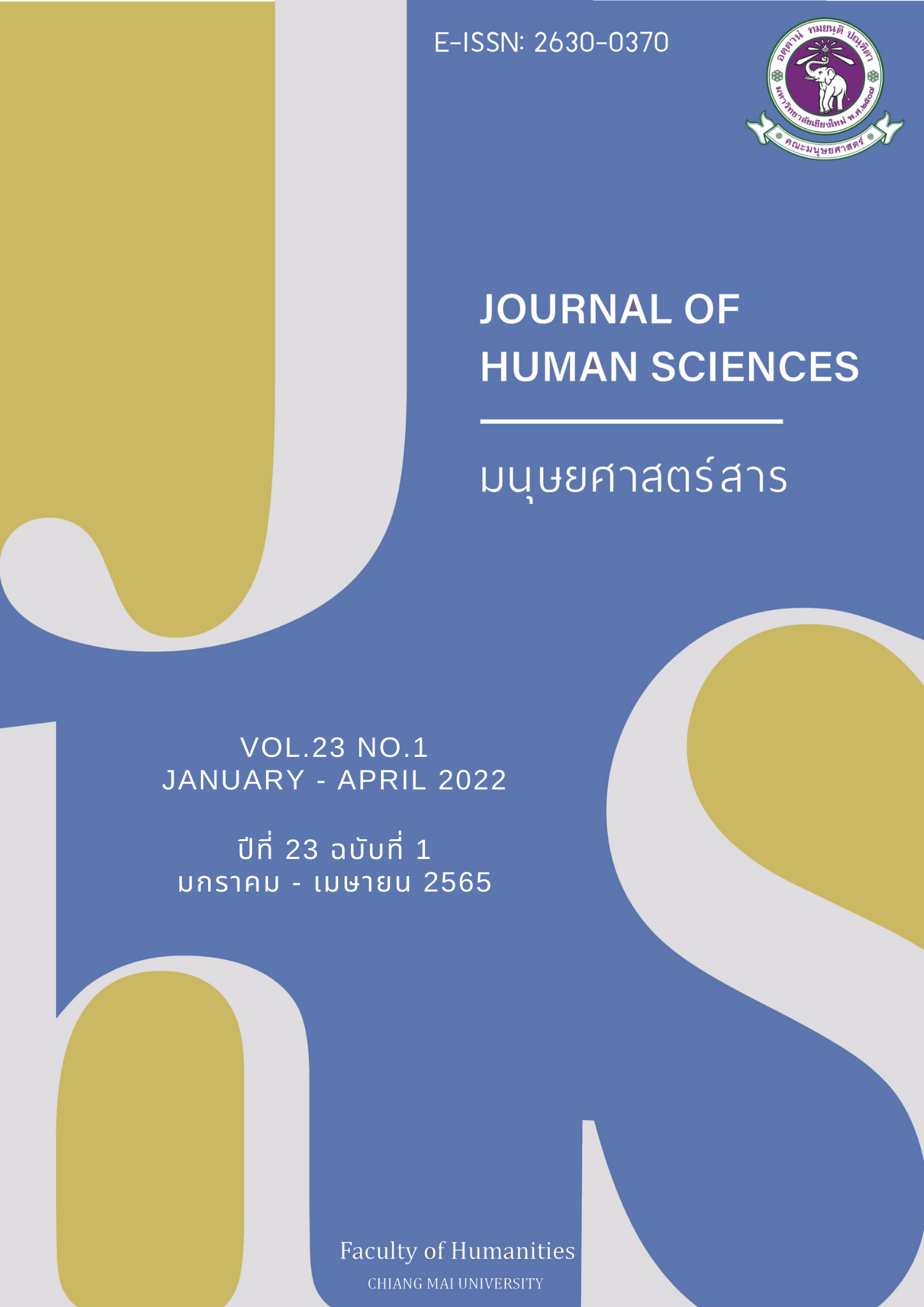การเปลี่ยนแปลงภาพลักษณ์ของ “โยไก” ของประเทศญี่ปุ่นตั้งแต่สมัยโบราณจนถึงสมัยปัจจุบัน
Main Article Content
บทคัดย่อ
โยไก” เป็นผีของญี่ปุ่นมีความเป็นมาที่ยาวนานตั้งแต่ศตวรรษที่ 8 ผู้วิจัยจึงมีความสนใจศึกษาการเปลี่ยนแปลง“ภาพลักษณ์” ที่มาจากการรับรู้จากสิ่งที่เป็นรูปธรรมของโยไกเพื่อศึกษาความเปลี่ยนแปลงและปัจจัยที่เกี่ยวข้องโดยดูจากหลักฐานที่ปรากฏในรูปแบบต่างๆ เช่น บันทึก ตำนาน ภาพวาด หนังสือและหลักฐานอื่นๆ จากการวิจัยพบว่า โยไกในสมัยโบราณนั้นมีภาพลักษณ์ของความน่ากลัวเป็นอันตรายต่อมนุษย์และมีความเกี่ยวข้องกับเทพเจ้า เมื่อประเทศญี่ปุ่นได้รับอิทธิพลจากพุทธศาสนาส่งผลให้มีการวาดภาพโยไกอย่างเป็นรูปธรรมและเป็นภาพในนรก ภาพลักษณ์ของโยไกจึงมีความน่ากลัวเช่นภาพของโอนิและเท็งงุ ต่อมาโยไกกลายเป็นตัวละครในสมัยคามาคุระจนถึงสมัยเอโดะในรูปแบบของสิ่งบันเทิง เช่น ภาพม้วน หนังสือนิยายและของเล่น จากวิวัฒนาการภาพพิมพ์แกะไม้แบบนิชิกิเอะและการสร้างสรรค์ตัวละครทำให้โยไกมีความเป็นตัวละคร มีสีสันสดใส มีภาพลักษณ์ของตัวละครที่มีความน่ารัก ตลกขบขันและกลายเป็นสินค้า ปัจจัยที่สำคัญที่ส่งผลต่อการเปลี่ยนแปลงภาพลักษณ์ของโยไกคือ อิทธิพลของภาพพิมพ์แกะไม้ในสมัยเอโดะที่ส่งผลต่อการขยายตัวของสิ่งพิมพ์ทำให้โยไกได้รับความนิยมอย่างสูงสุด ในสมัยเมจิโยไกยังคงเป็นสินค้าสำหรับเด็กและเป็นเรื่องที่นักวิชาการสมัยใหม่สนใจศึกษา และช่วงหลังสงครามโลกครั้งที่สองจนถึงปัจจุบันโยไกมีภาพลักษณ์ที่หลากหลายทั้งน่ารักและน่ากลัวแต่ไม่ได้เป็นความเชื่อและเป็นตัวละครและสินค้าในรูปแบบต่างๆ
Article Details

อนุญาตภายใต้เงื่อนไข Creative Commons Attribution-NonCommercial-NoDerivatives 4.0 International License.
เอกสารอ้างอิง
Der Arslanian, B. (2020). [Japan’s Revitalization: Key Success Factors and Implementation in the Aspect of Machizukuri]. Thailand Science Research and Innovation, Bangkok, Thailand. [In Thai].
Department of Archelogy, Research Society for Anthropology of Tenri University. (2016). Study for sources of Monster and Yokai from Things and Symbols. Tokyo: Bensei Publishing. [In Japanese].
Hirota, R. (2014). Not One, but many Ontologies for Yokai – Critique of the Ontological Commitment in Yokai Studies. Journal of Living Folklore, 6(3), 113-128. [In Japanese].
Ichikawa, H. (2018). The Contemporary Use of the Re-Creation of Yokai: From the Perspective of the Possibility for an Educational Tool. Study in Art Education, 50(1), 57-64. [In Japanese].
Iwai, H. (2015). Visual Version: Encyclopedia of Japanese Yokai. Tokyo: Kawade Publishing. [In Japanese].
Iwai, H. (2017). Illustration of Japanese Yokai. Tokyo: Kawade Publishing. [In Japanese].
Komatsu, K. (2001). Selection of Inoue Enryou. Toyo University Repository for Academic Resources, 5-20 (21), 449-463. [In Japanese].
Komatsu, K. (2011). Basic Knowledge of Yokai Studies. Tokyo: Kadokawagakugei Publishing. [In Japanese].
Komatsu, K.& Iikura, G. (2015a). Perfect Visual Guide of Japanese Yokai. Tokyo: Kanzen Publishing. [In Japanese].
Komatsu, K.& Iikura, G. (2015b). Japanese Yokai. Tokyo: Takarajima Publishing. [In Japanese].
Miyamoto, S. (2017). Illustrated Encyclopedia of Japanese Yokai. Tokyo: Gakkenplus. [In Japanese].
Miyata, N. (1990). Folklore of Yokai. Tokyo: Iwanamishoten. [In Japanese].
Nagata, M. (2016). Illustration Dictionary: Japanese Yokai. Tokyo: Shinsei Publishing. [In Japanese].
Research Society for Folklores about Monsters (2014). Identity of Monsters. Tokyo: Kasakura Publishing. [In Japanese].
Study Society of Edo Culture. (2015). Yokai in the Edo Period from Picture Scroll. Tokyo: Kosaido. [In Japanese].
Tsunemitsu, T. (2012a). Illustrated Book of Japanese Yokai – 1. Yokai in the Form of Women. Tokyo: Minerva Publishing. [In Japanese].
Tsunemitsu, T. (2012b). Illustrated Book of Japanese Yokai – 1. Yokai in the Form of Men. Tokyo: Minerva Publishing. [In Japanese].
Tsunemitsu, T. (2012c). Illustrated Book of Japanese Yokai – 1. Yokai in the Form of Animals. Tokyo: Minerva Publishing. [In Japanese].
Watanabe, M. (2008). The “Youkai Maga” and the Present Age. Journal of Seigakuin University, 21(2), 249-260. [In Japanese].
Yamashita, T. (2014). General Knowledge of Yokai. Tokyo: Futaba Publishing. [In Japanese].
Yamaguchi, B. (2016). Collection of 200 Japanese Yokai. Tokyo: Seito Publishing. [In Japanese].


